Looking for the Best Cat Flea Treatments and medications? Fleas are not just a pesky nuisance; they can also pose health risks to your feline companion. Protecting your cat from these tiny invaders ensures their comfort and well-being. With countless products on the market, choosing the right one can be daunting. In this article, we’ll guide you through top-rated treatments and medications, ensuring your cat remains flea-free and happy. Let’s dive in and keep those pesky pests at bay!
1. PetArmor CAPACTION (nitenpyram) Oral Flea Treatment for Cats
The PetArmor CAPACTION oral flea treatment for cats is a fast-acting medication that starts killing fleas within 30 minutes of administration. It is safe for kittens and cats weighing between 2-25 lbs and can be used on pregnant or breeding cats. With 6 doses in each pack, this oral flea tablet efficiently kills adult fleas, potentially reducing the likelihood of allergy dermatitis.
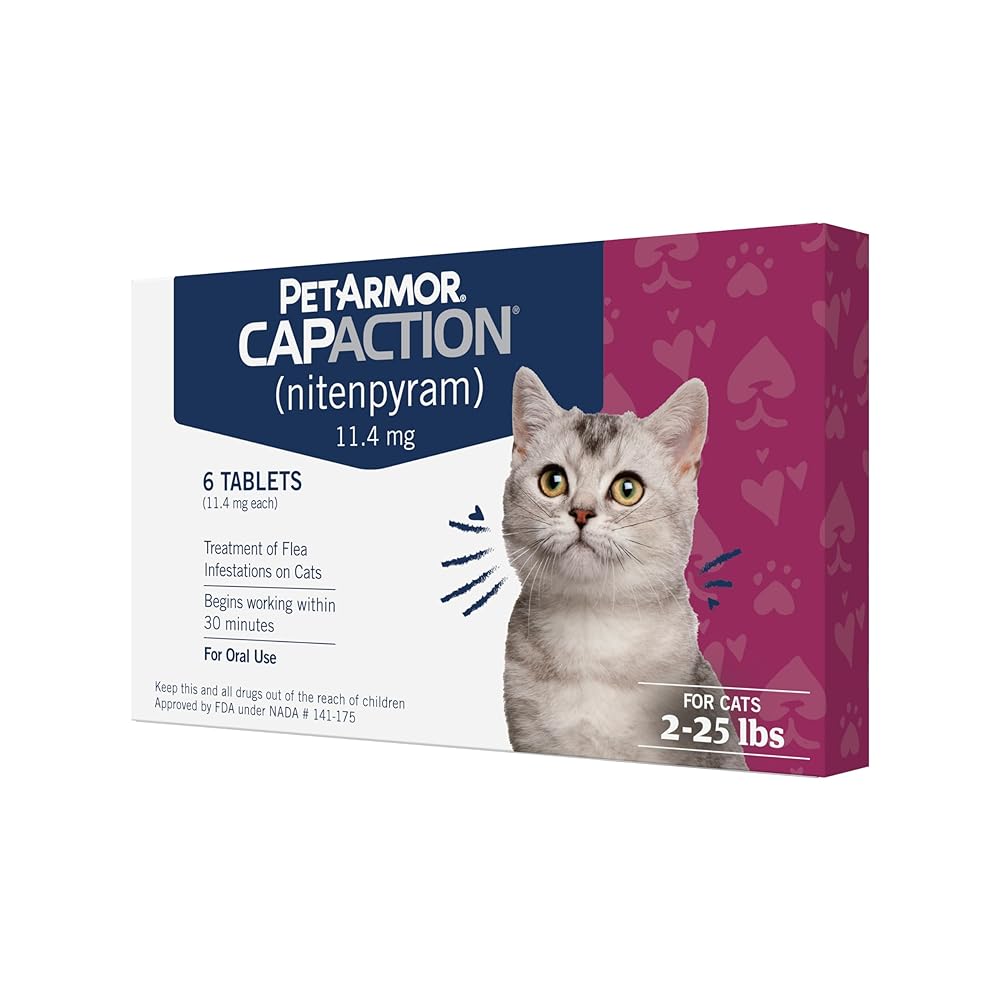
2. Advantage II Large Cat Vet-Recommended Flea Treatment & Prevention
Advantage II Large Cat is a popular option for effective flea treatment and prevention for larger cats weighing over 9 lbs. It is recommended by veterinarians and is easy to apply as a monthly topical treatment. The product provides comprehensive protection against fleas, killing adult fleas, flea larvae, and flea eggs upon contact. It starts to work within just 12 hours and remains effective for 30 days. Additionally, it is fragrance-free and becomes waterproof 24 hours after application.
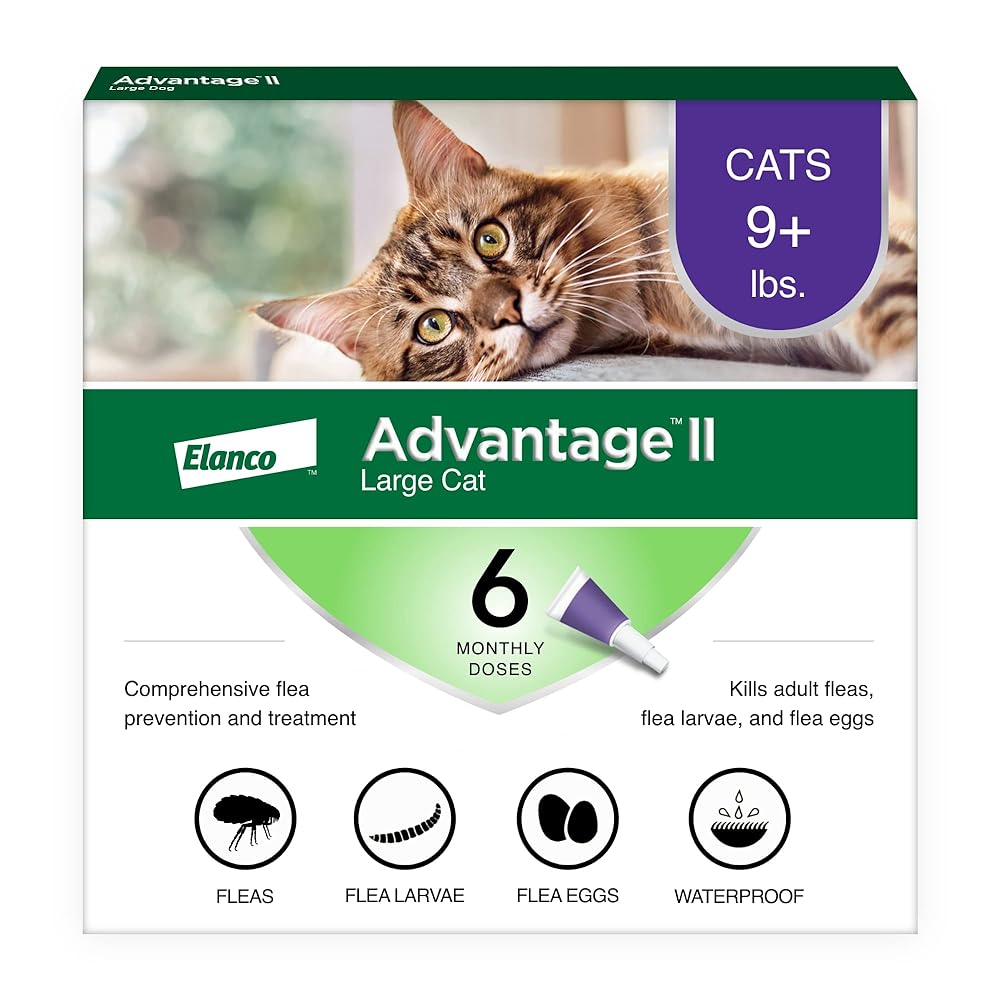
3. Advantage XD Large Cat Flea Prevention & Treatment
Advantage XD Large Cat is a flea prevention and treatment product for cats over 9lbs. It offers 2 months of protection per dose, making it longer-lasting than other topical products. The fast-acting treatment starts killing fleas within 30 minutes to 4 hours and is easy to apply. It also contains a naturally derived ingredient, Spinetoram, which has won a Green Chemistry award.
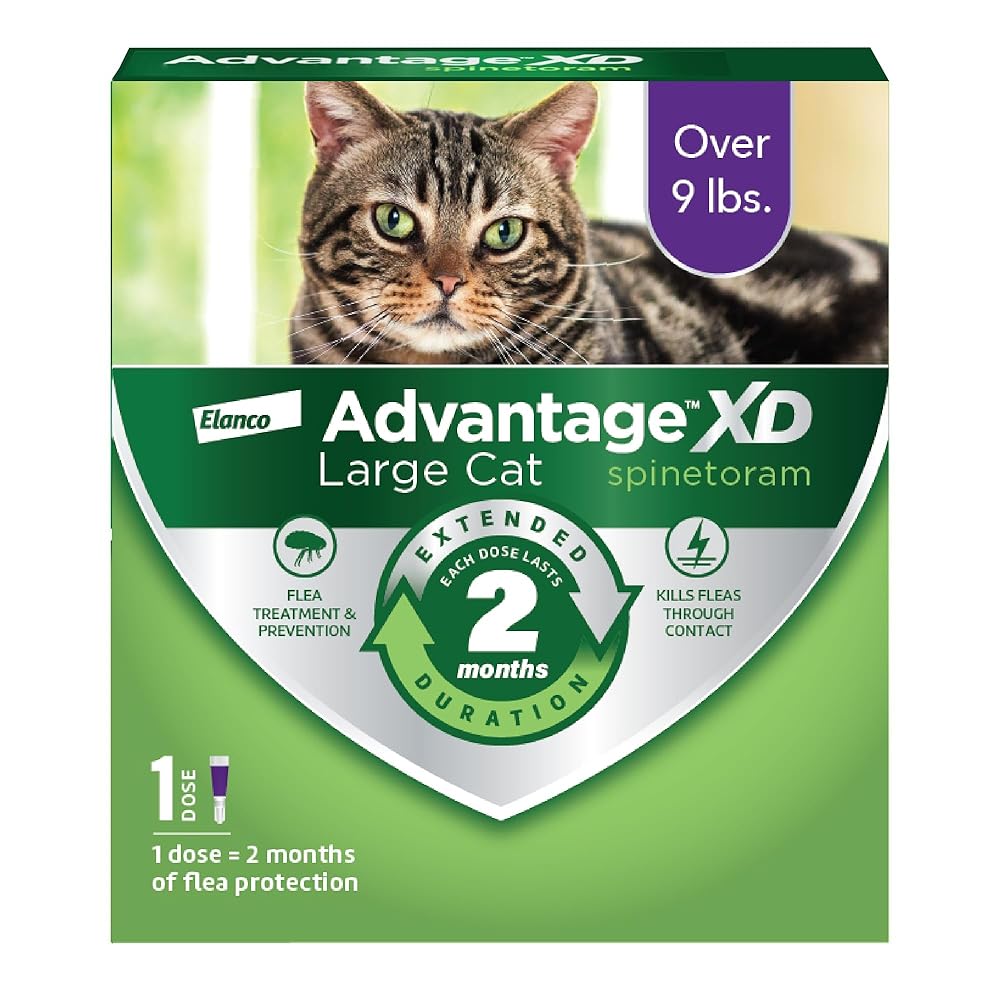
4. CAPSTAR (nitenpyram) Oral Flea Treatment for Cats, Fast Acting Tablets Start Killing Fleas in 30 Minutes
Capstar is an oral flea treatment for cats that starts killing fleas within 30 minutes of administration. It is recommended by veterinarians and backed by research, making it a reliable solution for flea infestations. This flea pill does not require a prescription and can be used for cats weighing 2-25 lbs. Additionally, it can be administered multiple times if your pet gets re-infested with fleas.
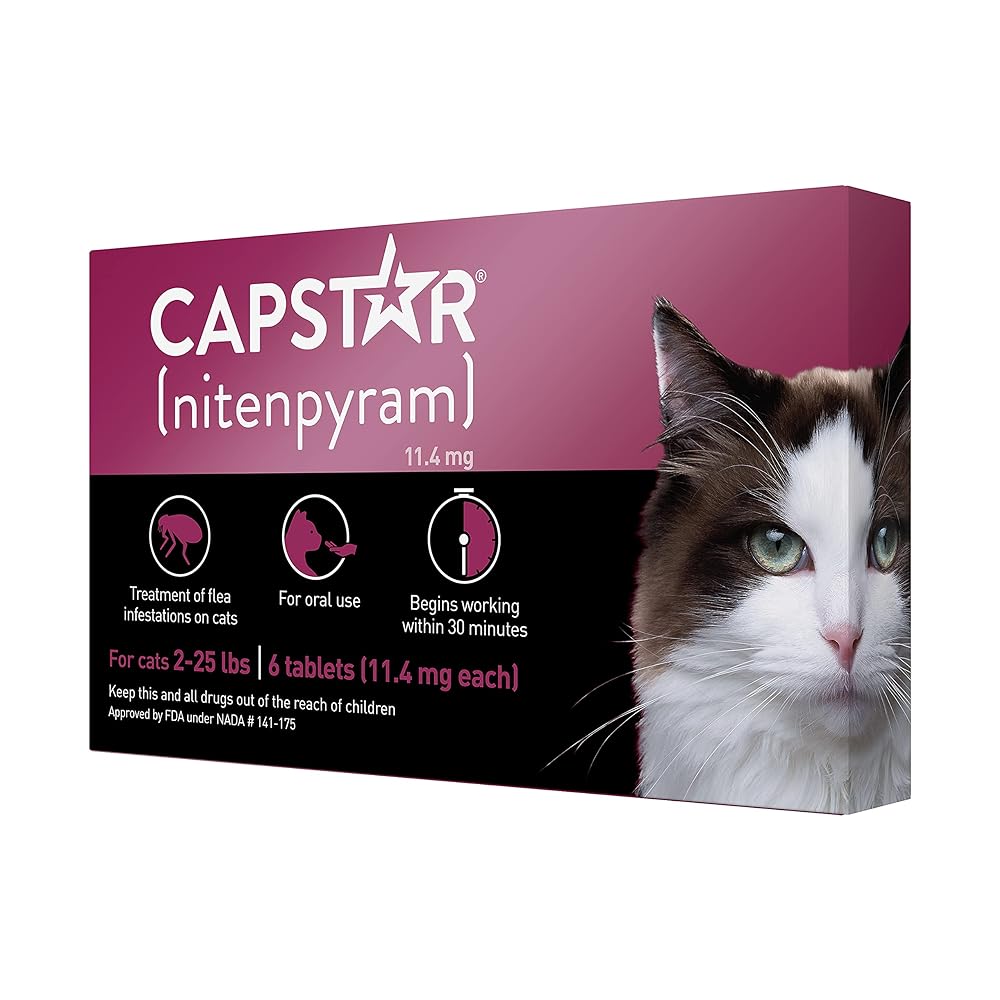
5. TevraPet Actispot II Flea Treatment for Small and Medium Cats 5-9 lbs
TevraPet Actispot II Flea Treatment for Small and Medium Cats is a veterinarian-approved topical treatment that effectively kills fleas, flea eggs, and flea larvae for up to 30 days after each application. It uses the same active ingredients as Advantage II but is more affordable. The treatment repels and kills fleas on contact, without the need for biting, and breaks the flea life cycle to prevent re-infestation. It is easy to use and made in the USA.
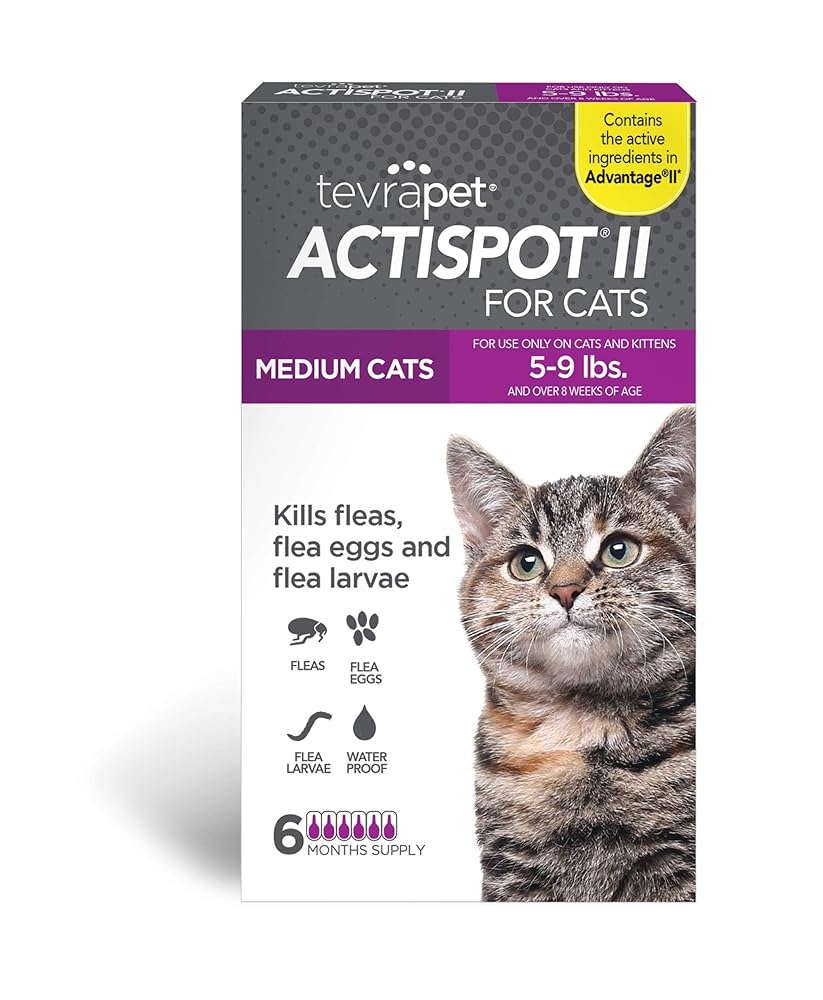
6. Hartz UltraGuard Topical Flea & Tick Prevention for Cats and Kittens
The Hartz UltraGuard Topical Flea & Tick Prevention is a product designed to protect cats and kittens from fleas, ticks, and mosquitoes. It comes in a convenient single-dose tube format, making it easy to apply. The formula effectively kills fleas and deer ticks and also provides a repellent effect against mosquitoes for up to 18 days. It is suitable for use on cats and kittens that are at least 12 weeks old and weigh 5 pounds or more.
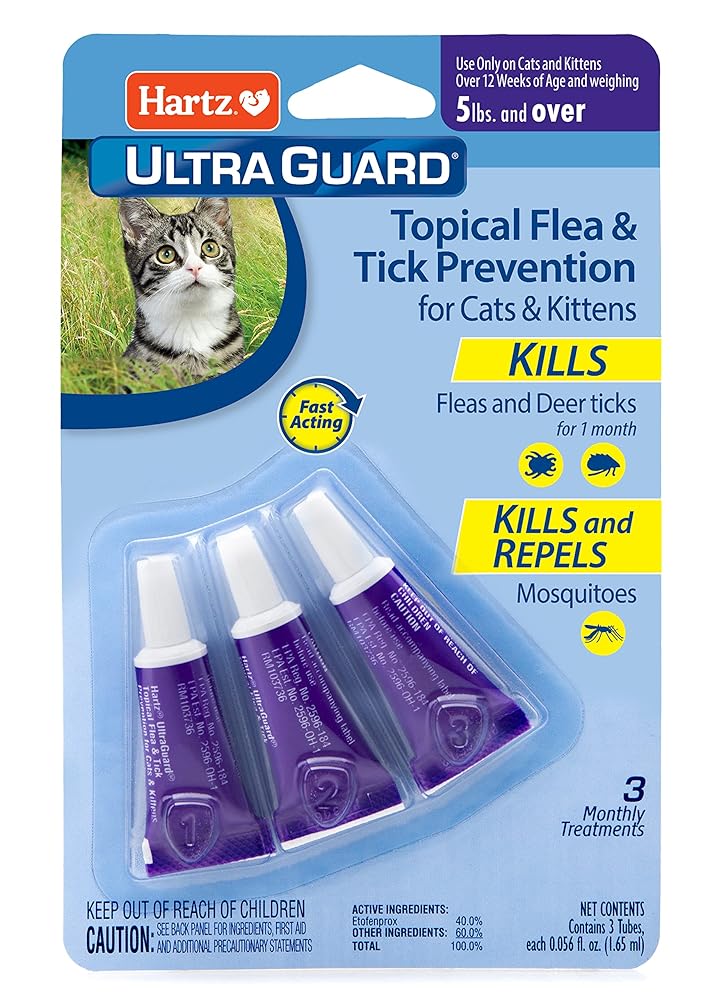
7. FRONTLINE Plus Flea and Tick Treatment for Cats Over 1.5 lbs.
Frontline Plus Flea and Tick Treatment for Cats is a waterproof and long-lasting solution for preventing and treating flea and tick infestations on cats and kittens over 1.5 lbs. The product effectively kills adult fleas, flea eggs, lice, and ticks, including those that may transmit Lyme disease. Trusted by veterinarians for almost 20 years, this treatment provides 30 days of continuous protection and can break the flea life cycle.
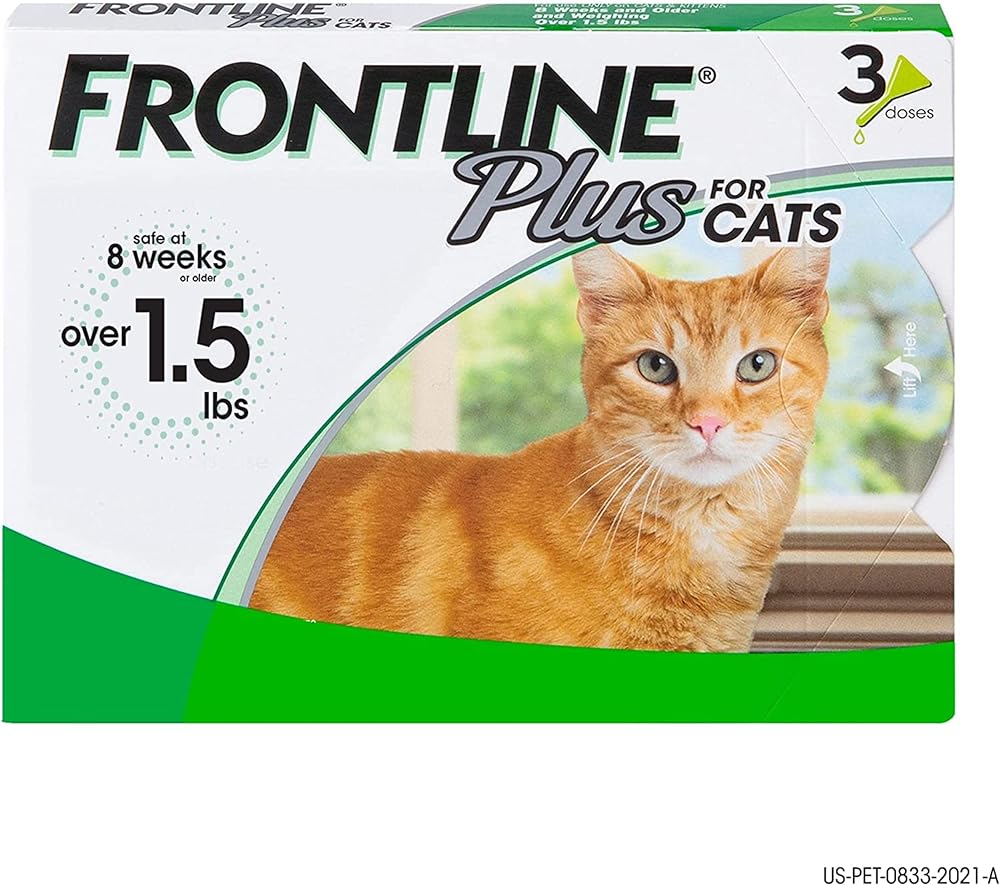
8. PetArmor Plus for Cats, Flea & Tick Prevention for Cats Over 1.5 lbs, Waterproof and Fast-Acting Topical Flea and Tick Medication
PetArmor Plus for Cats is a practical and efficient solution for flea and tick prevention in cats over 1.5 lbs. This waterproof topical treatment contains the same active ingredients as FRONTLINE Plus for Cats, ensuring its quality and efficacy. By breaking the flea life cycle and killing eggs and larvae, PetArmor Plus provides long-lasting protection from fleas, ticks, and chewing lice for up to 30 days after application. With a six-month supply, this easy-to-use treatment guarantees the well-being of your furry family members.

9. Wondercide – Flea, Tick & Mosquito Spray for Dogs, Cats, and Home – Control, Prevention
Wondercide is a flea, tick, and mosquito spray for dogs, cats, and the home. It is made with natural essential oils that have been proven to kill, repel, and prevent 98-100% of fleas, ticks, and mosquitoes. The spray is safe for pets of all ages, including puppies and kittens, and can be used throughout the home to eliminate pests on furniture, bedding, and flooring.
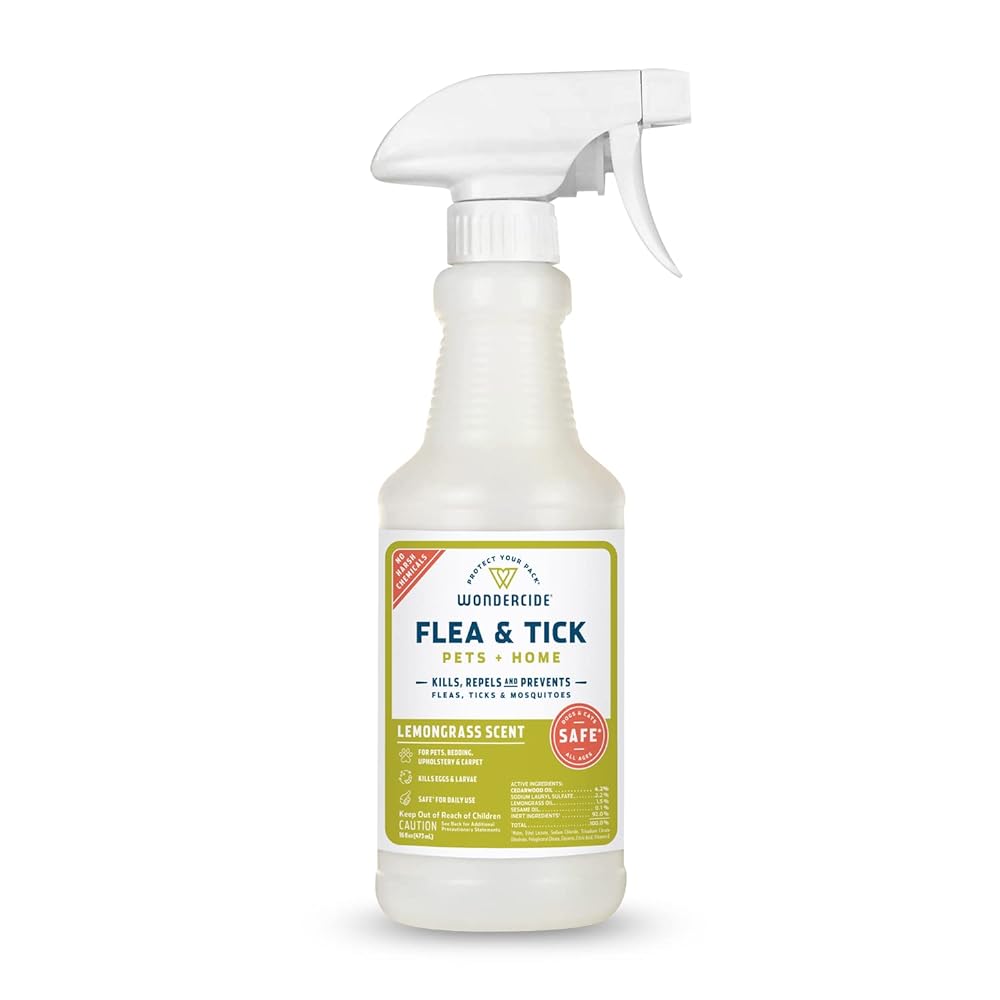
What Should I Consider When Choosing a Flea Treatment/Medication for My Cat?
- Cat’s Age and Size: Many flea treatments are age and weight-specific. Puppies and kittens may require different formulations than adult pets.
- Current Health and Medical History: Some treatments might not be suitable for cats with specific health conditions. For example, a cat with a history of seizures might be more sensitive to certain flea control ingredients.
- Product Efficacy: Look for products with proven effectiveness. Not all flea treatments are equally effective, so research or ask your vet for recommendations.
- Application Method: Flea treatments come in various forms like topical treatments, oral medications, collars, sprays, and shampoos. Consider what will be easiest for you and most tolerable for your cat.
- Duration of Effectiveness: Some treatments offer protection for a month, while others might last only a week. Choose a product based on how often you’re willing or able to re-administer.
- Potential Side Effects: While most treatments are safe, some cats might experience side effects. Familiarize yourself with possible reactions so you can monitor your cat post-application.
- Environmental Factors: If you live in an area with a high flea population or if your cat spends time outdoors, you might need a more robust or frequent treatment.
- Cost: While you want the best for your cat, consider your budget. Sometimes, more expensive doesn’t necessarily mean better. Look for a balance of cost and effectiveness.
- Multi-Pet Households: If you have multiple pets, you’ll need to ensure that the treatment is safe for all. Some cat treatments can be harmful to dogs and vice versa.
- Veterinarian Recommendation: Always consult your veterinarian before starting any flea treatment. They can provide insights specific to your cat’s needs and recommend the most appropriate products.
What Risks Are There When Using Pesticide Based Flea Treatments for Cats?
- Toxicity: The most significant risk with pesticide-based treatments is potential toxicity. Cats have unique physiology and might be sensitive to certain chemicals that are otherwise safe for other animals. Ingesting even small amounts of some pesticides, often when grooming, can lead to symptoms like drooling, vomiting, tremors, seizures, or even death.
- Allergic Reactions: Some cats might develop an allergic reaction to the chemicals in the flea treatment. Symptoms could range from mild skin irritation and redness to severe itching or swelling.
- Chemical Burns or Skin Reactions: In rare cases, topical treatments can cause chemical burns or skin reactions. This usually manifests as redness, sores, or hair loss at the application site.
- Residue Concerns: Topical pesticide treatments can leave residues on cat fur, which might be transferred to humans or other pets upon contact. This is particularly a concern for households with small children.
- Interactions with Other Medications: Pesticide-based flea treatments can sometimes interact with other medications or treatments your cat is receiving, leading to adverse effects.
- Overdose: Accidentally administering a higher dose than recommended can result in an overdose, with symptoms ranging from mild discomfort to severe neurological issues.
- Inappropriate Product Use: Using a dog-specific flea treatment on a cat is particularly risky. Some ingredients safe for dogs can be highly toxic to cats.
- Environmental Concerns: Pesticide-based treatments, when washed off or shed, can enter the environment, potentially affecting other wildlife or contaminating water sources.
Frequently Asked Questions About Flea Treatments for Cats
- Why should I treat my cat for fleas even if I haven’t seen any?
- Fleas are tiny and can often go unnoticed until there’s a significant infestation. Regular preventative treatments keep your cat protected and can help avoid potential health issues related to flea bites.
- Are over-the-counter flea treatments as effective as prescription ones?
- While some OTC treatments can be effective, prescription treatments typically have undergone more rigorous testing for efficacy and safety. Always consult your vet for the best option for your cat.
- Can I use dog flea treatments on my cat?
- No, never use dog-specific treatments on cats. Some ingredients safe for dogs can be highly toxic to cats, leading to severe reactions or even death.
- How often should I apply flea treatment to my cat?
- It varies by product. Some offer protection for a month, while others might require weekly applications. Always follow the manufacturer’s recommendations.
- My cat had a bad reaction to a flea treatment. What should I do?
- Wash the product off immediately with mild soap and water and contact your veterinarian. They can guide you on further steps and offer treatment if necessary.
- Are there natural alternatives to chemical flea treatments?
- Yes, there are natural products like diatomaceous earth or herbal repellents. However, their efficacy may vary, and it’s essential to ensure they’re safe for feline use.
- Can I give my cat a flea treatment if she’s pregnant or nursing?
- Consult your veterinarian before treating a pregnant or nursing cat. Some treatments might be safe, while others are not recommended during these stages.
- How do flea collars work, and are they effective?
- Flea collars release chemicals that repel or kill fleas. Their effectiveness can vary, and some cats might find them irritating. It’s essential to choose a collar designed specifically for cats and monitor for any signs of discomfort.
- What’s the difference between flea treatments and flea preventatives?
- Flea treatments typically address active infestations, killing adult fleas on your cat. Preventatives focus on repelling fleas or disrupting their life cycle to prevent future infestations.
- Do indoor cats need flea treatments?
- While indoor cats have a lower risk, they’re not immune to fleas. Fleas can enter homes on clothing or other pets, so it’s wise to consider preventative measures even for indoor cats.
Final Summary: The Best Cat Flea Treatments & Medications
In this article, we reviewed the Best Cat Flea Treatments and medications. Ensuring your feline friend is protected from fleas is crucial for their health and comfort. By investing in quality treatments and medications, you can prevent infestations and the complications they bring. Remember, it’s always best to consult with a veterinarian to choose the most suitable option for your cat. With the right care, your kitty can enjoy a flea-free life, giving you peace of mind and the comfort they deserve.




